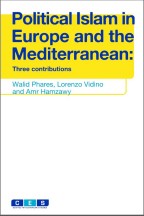Fonte:
Centre for European Studies - CES
Autore:
Walid Phares, Lorenzo Vidino e Amr Hamzawy
Introduction
Political Islam is increasingly important to European politicians and policymakers. Europe’s Muslims are growing in numbers, and some form and join political organisations that articulate Islamic values in the public sphere. Muslim countries that neighbour Europe across the Mediterranean and BlackSeas are going through a period of rapid political change, as demonstrated by the anti-authoritarian uprisings in North African and the Middle East that began in December 2010. Although Political Islam was, in most cases, not at the origin of the protests, it may play a more important role in the region in future. The Centre for European Studies (CES) has a long-term commitment to promoting debate on the role of religion in politics, and the role of political Islam in particular. The CES specifically contributes to discussions on how Europe’s centre-right should approach Muslim, Islamic and Islamist political organisations. As one of its activities in this area, the CES organised, in cooperation with the Political Academy of the Austrian People’s Party and International Republican Institute, ‘The Atlantic Seminar: Understanding Political Islam’ in Vienna in March 2010. The present publication includes three edited papers from this seminar. These papers, by Walid Phares, Lorenzo Vidino and Amr Hamzawy, differ in their geographical coverage and in their focus on specific parts of the Muslim political spectrum. These papers also include different suggestions on how centre-right parties in Europe should respond to and engage with political Islam.
The paper by Walid Phares gives a general overview of Islamic politics in North Africa and the Middle East. It suggests that European centre-right politicians need to create partnerships with those Muslim and Islamic movements that embrace the greatest number of liberal democratic values, even if these movements are weak and least influential at present. Nevertheless, Europe and the West should maintain contacts with all Islamic and nonjihadist movements that do not promote terrorism.
Lorenzo Vidino’s paper examines political Islam in Europe, looking in particular at one of its branches, the New European Brothers. Vidino advocates a cautious approach to the Muslim Brotherhood in Europe, stressing the importance of local conditions. In individual European countries, centre-right politicians need to study the particular organisations of the Muslim Brotherhood and the situation in the particular Muslim community before deciding on whether to engage, or rather confront the particular Islamic political organisation.
Finally, Amr Hamzawy’s paper offers insights into those Islamist movements in Egypt, Morocco and Yemen that participate in their countries’ political systems. Hamzawy shows that that the political practice of these participatory Islamic movements often differs from their religious platforms. In dealing with these Islamist movements, the West needs to make an effort to distinguish between their religious rhetoric on the one hand and their policies on the other hand. The West also needs to recognise the dynamic nature of these movements, which are increasingly adopting strategies of political participation while, at the same time, retaining a proselytising role in the religious sphere.


